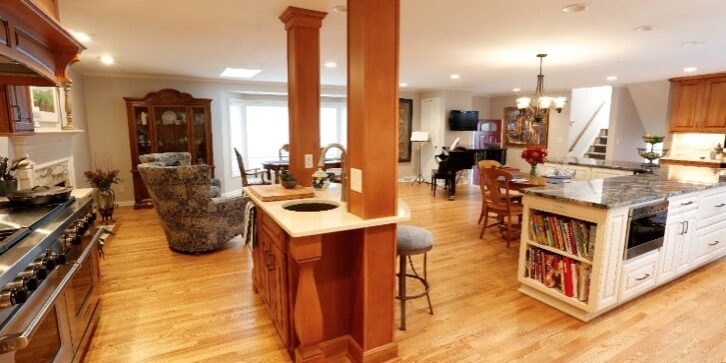Make the Right Choice In Hardwood Flooring. Here’s How.
Which type of hardwood is right for your home? It’s a question we get at Dover almost every day. There are so many thing to consider when choosing a flooring product for your home remodeling application: environmental conditions, lifestyle, aesthetics. In my last post, I covered a host of tips for product selection. Here are a few more items to think about to help you simplify the process and choose the hardwood that’s right for you:
Types of hardwood. There are a host of options for hardwood flooring. Among the most popular North American hardwoods are oak, maple and hickory: all of these are good, high-quality hardwoods for most applications. The softer hardwoods include American cherry, walnut and some pines. Although beautiful, they are not as durable, showing indentations much easier. Among the hardest, most dense woods available are in the exotic category: Brazilian cherry, Brazilian teak and tigerwood, just to name a few. These ultra-premium hardwoods can carry a higher price point.
While bamboo is actually a grass, it’s still included in the hardwood category. It is sold in a plank format similar to other hardwoods. With traditional bamboo the stalks are either assembled in a vertical or horizontal format, offering two different visuals but clearly have the look of bamboo. A third type of bamboo is a stranded bamboo product. The stranded variety is assembled utilizing the bamboo fiber with resins under extreme pressure and heat. This process creates a bamboo plank with a different visual and a very hard, dense and very durable core. Although a good option for a higher traffic area where more durability is required, it is still a natural product with a urethane finish which is susceptible to scratching and indentations.
One nice feature about bamboo is that it grows very quickly, and quicker to be replenished than a most. A good thing to know is the older and more mature the bamboo plant, the denser the material becomes, which makes a better flooring material. This variable can be difficult to identify. Ask your retailer about the harvesting age of the bamboo to ensure a better-performing product. An upside of bamboo flooring is that when the bamboo is harvested, it is replenished, so it is a sustainable, eco-friendly flooring product option.
A side note: I get questions from customers about emissions from certain types of flooring products utilizing adhesives with potentially harmful chemicals. There’s a stringent level of quality control and government guidelines related to indoor air quality that you’ll find your better manufacturers adhere to and do not compromise. To be safe, go with a reputable flooring resource that stocks clean, safe, quality product.
Installation. With some exception, solid hardwood and engineered is best installed perpendicular to the floor joist when installation over a wooden substrate. A nail-down installation with the correct underlayment and fastener is how most hardwoods are attached. A glue-down installation with a premium adhesive is necessary when adhering to concrete, this method can be used in other specific situations as well. An important note, when installing over concrete, a proper moisture test is imperative. At Dover, we complete an RH test and document our findings prior to every installation over concrete; this RH Test (relative humidity tests) gives us the temperature and relative humidity in multiple areas and is one of the most conclusive tests in the industry, which goes a long way toward ensuring a solid, high-performing install.
If you want a clean, seamless install, go with the pros. We understand the mechanical aspects of an installation that really does make all the difference. Knowing and adhering to the best practices for a proper installation that will last a lifetime is our business. Glue-down, nail-down, concrete sub-floor, plywood subfloor, temperature, relative humidity, solid or engineered? What’s best for me in my specific situation?
With hardwood, you get what you pay for: Better manufacturers produce longer length planks, which create a more attractive aesthetic. Bargain retailers often sell end lots, which are shorter boards. These planks create a choppy install—one that lacks the clean, harmonious look of a premium hardwood installation.
At Dover, our installers pay close attention to the details…they work out of different boxes to get a variety in the planks and involve the homeowner to ensure that they get the look that they want. Beyond that, Dover is a home remodeler first, so we do it better than anyone: After the flooring is installed, we run baseboard and shoe molding and then paint, caulk and finish all trim—all finished by our carpenters.
It’s our promise at Dover to deliver an exceptional experience for our customers—which includes the best in product offering, installation and service. If you’d like to talk about your hardwood flooring installation, stop in and see me at the store.
Dover Floor & Tile Center – The most secure purchase you can make!
Tschaun Procaccini







